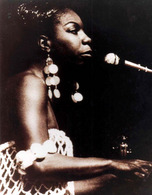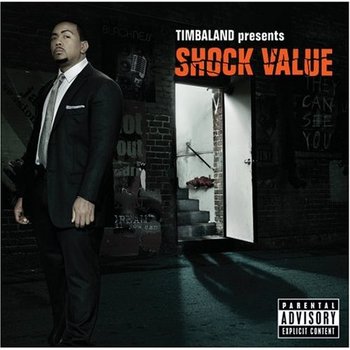Oh Timbaland
Thu. August 9, 2007Categories: Abstract Dynamics
(being, amongst other things, a belated billet-doux to Future sex/ Love Sounds)
 |  |  |
If Rihanna is the Queen of Pop, then Timbaland is now restored to his rightful place as King. The fact that Rihanna has finally been displaced from the UK number 1 slot by Timbaland’s ‘The Way I Are’ means that we have had the best succession of number 1s since…who knows when. It’s hard not to read Timbaland’s continuing pre-eminence as a symptom that things are moribund elsewhere (where are all the young turks gunning for his crown?), but Timbaland is a moving target, and today’s Tim is not at all the same beast as Timbaland 97.
Three years ago, Timbaland looked as if he was idling into irrelevance. It’s significant that his reinvention went via Nelly Furtado and Justin Timberlake: no-one can doubt any more that he is a pop – rather than an r and b or hip hop – producer. Timbaland’s productions may no longer so ostentatiously advertise their weird geometries, but they have acquired a slow burn subtlety. It took me a while to acclimatize to the new Timbaland. I found the unconsummated cocaine buzz of ‘SexyBack’ immediately addictive because it gave me what I expected and wanted from Timbaland: a Foxxoid EBM slink over which Tim presided as some psychotic mis-director, inviting JT to take us to a chorus that would never come, the song looping back to the verse from an Escheresque bridge that led nowhere. Initially, however, I had made the lazy mistake of dismissing the rest of Future Sex/ Love Sounds as a series of formally conservative, if superior, ballads, Timbaland sacrificing his avant-edge to the requirements of the ballad form. But, a year too late, and I’m practically obsessed with the LP, and what I most value in Timbaland’s current incarnation is his luxurious refurbishment and modernization of the Ballad.

Future Sex now strikes me as a sumptuous neo-disco noo-wop song suite lent a space-station sheen by Timbaland’s epic production.
Voyou – who wasn’t nearly so slow off the mark as me in swooning for Future Sex‘s charms – intriguingly described the LP as queering of r and b. But part of what interests me about the LP is the way that it re-invents r and b heterosexuality from the male point of view. It’s as if Timberlake has sought to rise to the demands made by pop’s female desiring-machine in the last decade – can this baby boy keep up? If Justin is still too (baby) boyish to entirely convince as the man on a mission to please’ of the title track, it is at least heartening that the song is orientated towards female gratification.
The obvious precursor for Future Sex/ Love Sounds would be Prince who can miss the echoes of Lovesexy in the title? – but, for my money, Future Sex outdoes anything that revolting priapic spiv ever achieved. Timberlake has a capacity to dissolve into the sound, to melt into multi-tracked falsetto, to coo and croon, that Ive never found in the preening Prince, even though his supporters always attribute such lovestruck ego-dissolution to him. (A better comparison for the Timberlake of Future Sex might be Blackstreet, who at their best rendered male desire in terms of a blissful disabling.)
The characteristics of JT that made me have misgivings around the time of Justified – a certain blankness, a desire to please standing in for charisma – have now become virtues. On Justified neither Timbaland nor the Neptunes came up with a sonic design sufficiently unique to dispel the impression that Timberlake was a boyband refugee become Michael Jackson wannabe. But Timberlake’s ingenuousness is now the perfect complement to Timbaland’s ingenuity, and the two appear to be influencing one another. (One other product of this collaboration is the love-hangover ballad ‘Rehab’ on the new Rihanna album, which Timberlake co-wrote and sang backing vocals on, and Timbaland produced.) Set a challenge by Timberlake, Timbaland hasnt given up his freaky-freaky weirdness so much as secreted it in the crevices and secret passages of the Ballad. Throughout the LP, Timbaland renders the non-relation between the sexes as an SF encounter, a bride-stripped bare conjoining of sounds that are suppurating-wet and Dali-desert dry, spine-crackingly hard and yieldingly soft. The production is all about the detail, a masterpiece of feints and faint traces, echoes and nuances (check, for instance, the slight nod to the Good Times bassline on Future Sex/ Love Sounds, Timbaland repositioning himself in a disco lineage).
Future Sex/ Love Sounds is a love-song suite that aims to compete with the very best. If Junior Boys’ So this is Goodbye was 06’s No One Cares, then Future Sex was its Songs for Swingin’ Lovers. (Greenspan and Timberlake, two synthetic disco Sinatras, with 21st century pharmaceuticals – or their sonic analogues – substituting for Frank’s martinis and whisky sours). Songs for Ravin’ Lovers, perhaps, with Timbaland’s magisterial arrangements – or derangements – plugging the Ballad into all the rushes, tics and washes in his post-Rave box of tricks.
As far as I’m aware, Timbaland has always denied that his production was directly influenced by the hardcore continuum, and in many ways it’s more interesting if he arrived at a similar abstract machine to Rave and its progeny by an entirely different route. Voyou brilliantly characterised Future Sex‘s ‘My Love’ as ‘weird ghost-rave (but not at all hauntological; more hammer horror, or Scooby Doo)’, a description so perfect that every time I hear the track now I’m unable to shake the image of an animated Justin being chased by white-sheeted cartoon ghosts, the inhuman gibbering and piping FX recalling some electro-ghoul from an 80s videogame. ‘My Love’ turns the commonplace of E as a luv’d up drug on its head, making the delirial exhilaration of falling in love sound like an E-rush, with a breathless JT – gabbling as if he has popped ten pills to many – fast forwarding through a virtual slideshow of anticipated future-love vignettes (‘I can see us holding hands/walking on the beach, our toes in the sand/ I can see us on the countryside/ sitting on the grass, laying side by side’).
Timberlake is at his best as the lover beguiled, betrayed and stoned by the object a, and what impresses is about Timbalands sympathetic-but-estranging production is how it situates JT in or rather distributes him across soundscapes that both complement and complicate the yearning, bliss and aches of the lovers discourse. On the bittersweet sunset-fading-into-gloom of ‘Summer Love’, it’s like Timberlake is trying to hold onto love as it begins to drain away before it has properly begun, the maudlin stomp of the rhythm track underscoring the edge of desperation beneath the lyric’s superficial optimisim (‘this just can’t be summer love’).
With ‘What Goes Around’, we are beyond the end of the affair – and beyond the pleasure principle. The song sees Timberlake lording it on the moral high ground, enjoying the just-deserts scenario of his betrayer herself being betrayed. Recrimination has replaced anticipation, and the stalled sitar loop and cycling love-comedown strings join with the abandoned Timberlake in mocking his ex-lover’s misery. Yet the amount of seething, sadistic jouissance that Timberlake derives from the situation (You spend your nights alone/ And he never comes home/And every time you call him/ All you get’s a busy tone/ I heard you found out/ That he’s doing to you/ What you did to me’) suggests that he is still in the grip of a love that is no longer alive but cannot die. By the time of the closing interlude, we even begin to suspect that the song is some Singing Detective-style revenge fantasy, and that his former lover has not been rejected by her new love at all.
‘Until the End of Time’ makes the oldest of pledges to the lover the cocoon of her embrace will be enough to protect JT from the slings and arrows of an indifferent universe but Timbaland gives it the widescreen treatment, and you feel as if you are surveying the cosmos from the bridge of a spaceship. The strings swirl like the milky way, while a massive Tommy Boy/ Leblanc-style snare pounds like a solar flare, spectacular and ominious.

Timbalands own solo LP from this year, Shock Value cannot compare with Future Sex. By contrast with the languid consistency of Future Sex – which, like So This is Goodbye, is an album that could only exist in the digital era – Shock Value suffers from a blight that afflicts so many CD albums. The plethora of tracks inevitably give it a piecemeal feel , an effect further amplified by an eclecticism that makes it difficult to digest (as a) whole. But there are plenty of jewels among the fragments, for instance:
Time, guesting Goth-devivalists She Wants Revenge (whod have thought that there would be a band influenced by the Danse Society in 2007?), which sounds like a karaoke Ian Curtis over a channelling of Shes Lost Control.
2 Man Show’, featuring Elton John on piano, the soundtrack to some impossibly lavish faux-baroque masque, which puts me in mind of the vogueing neo-New Romantic fops in Russell T Davies chic-anachronistic Casanova.
Most uncanny or should that be weird – of all: Oh Timbaland which digitally-doctors Nina Simones Sinnerman, so that, instead of singing Oh sinnerman, Simone appears to be saying Oh Timbaland’. The track was famously used in the closing credits sequence of INLAND EMPIRE, so Timbalands use of it poses an enigma: is it just a weird coincidence, or did Timbaland sample Sinnerman because he had seen the film? Either way, its fascinating, another example of Tims keeping it strange.